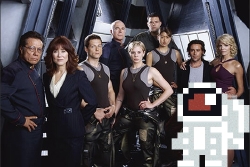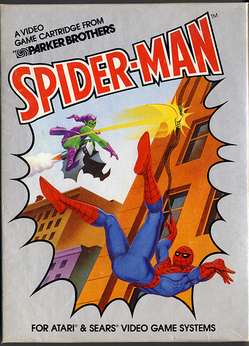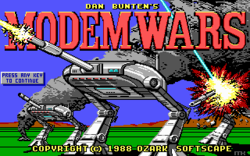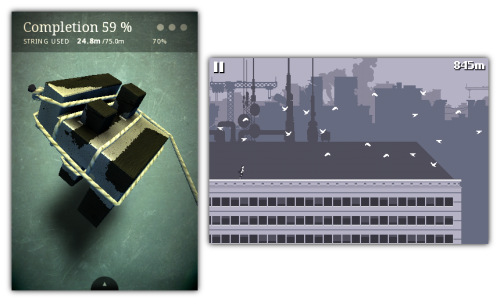Monthly Archives: March 2010
Which of these games is not like the other? Answer: both of them!
...That's a Zen joke. Here, let me fill your bathtub with brightly colored sleep furiously.
Here's the blurb for Zen Bound:
Zen Bound is a calm and meditative puzzle game about wrapping wooden sculptures with rope. A game in which a high score is not the goal - instead it is something to focus on and enjoy at your own relaxed pace.
...And here's the lead-in for Canabalt:
Tap to start your daring escape.
Bit of a difference in focus there, right?
These blurbs do not lie. In Zen Bound, you rotate your iPhone to wrap a rope around wooden blocks. There's no time limit. The soundtrack (by Ghost Monkey) is a slow, cool-and-smooth jazzy relaxation. You cannot die. You cannot lose.
In Canabalt, you sprint across the rooftops of a city that is being pulverized by giant robots. Let me say that again: pulverized by giant robots. Bombs fall around you, buildings crumble underfoot. You will eventually slip and fall. The soundtrack (by Danny Baranowsky) is a buzzing, thumping techno mix which puts the wind at your back. You cannot slow down. You cannot survive.
So, which of these games is relaxing to play?
Tags: canabalt, iphone, meditation, pacing, relaxation, stress, zen bound.
We're post-PAX, and we should all be fully recovered by Monday, April 12. Come join us at 6:30 in Nick Montfort's office at MIT, 14N-233.
The big news is that we're now officially the People's Republic of Interactive Fiction, and we have a cool new website, thanks to the efforts of Michael Hilborn and Andrew Plotkin. Mostly what's there now are meeting announcements and a big red "PLAY" button where you can play a sampling of IF games on the web.
Right now, it looks like the meetup will mostly focus on PAX and the website. Here's a tentative agenda:
- Talk about PAX. Lots of good stuff happened there, so there will be lots to talk about.
- Talk about the PRIF Hospitality Suite. This was the focus of IF activity at PAX, and it was certainly the best part of PAX for a lot of us.
- Play some of the PAX Speed IF games. There was a Speed IF run at PAX, where 9 games were made in a short amount of time.
- Discuss the PRIF website. Now that we've got our spiffy new website, what do we want to do with it? There was a lot of talk at PAX about IF outreach, and maybe we can find a way to fit into that.
As usual, we'll head to the Cambridge Brewing Company after the meetup to continue the conversation over food and/or drink.
Tags: boston, if, interactive fiction, meetup, pr-if.
We seem to be entering a nexus of documentaries about games. Far be it from me to do anything but encourage further flowering in this field! Witness:
Lorien Green has released a clip of Gone Cardboard, a film about board games -- particularly Eurogames, by the looks of it -- and the people who play them. She expects to release the final cut in early 2011. (Link via Kevin Jackson-Mead.)
The enigmatically named Spinach hopes to produce a doc about people who create digital games, called You Meet the Nicest People Making Videogames. That link leads to the project's Kickstarter fundraising page, which includes a teaser he filmed at GDC. Mr. Spinach approaches this endeavor from scratch, and needs help covering both equipment and travel costs, a position I can certainly appreciate. He's a quarter of the way to his goal, so far... (Link via Anna Anthropy.)
And of course, just 49 hours and 15 minutes after I type these words, I plan on attending the world premiere of Jason Scott's Get Lamp at PAX East. It is part of the interactive fiction track which is of course the real reason to attend the show, ho ho. Jason's been working on this film for years, and I was privileged to see a clip a few months ago at a Boston IF meetup. It's gonna be a goodie.
Tags: board games, digital games, documentaries, games, get lamp, if, interactive fiction, jason scott, kickstarter, links, lorien green, movies, pax, spinach, tabletop games.
 PAX is nigh, and therefore I expect to lose my ability to make coherent blog updates for a while. Before I stride boldly into the Hynes Convention Center to enjoy my 1.8 feet of personal space, I'd like to frame a question.
PAX is nigh, and therefore I expect to lose my ability to make coherent blog updates for a while. Before I stride boldly into the Hynes Convention Center to enjoy my 1.8 feet of personal space, I'd like to frame a question.
Despite my personal GDC takeaways, the big conversation that seems to have come out of the conference is all about "social games", a category that, while nebulous, seems to comprise half "Oh goddammit FarmVille" and forty-nine percent reaction to that. From what I can tell, a cynical-but-not-incorrect definition of "social gaming" is "the viral Skinner boxes acting as venture capitalists' flypaper du jour", and in that light I can't say it really captures my interest. And yet, I find myself thinking a lot about the potential of Facebook-based games, and wishing to challenge the common perception that player-abusive games are somehow intrinsic to the platform.
While I normally avoid dichotomies, I have to admit that I find Jesse Schell's model of "persuaders" versus "fulfillers" attractive and compelling; it strikes me not so much of a good-versus-evil simplification, but rather a Discordian-style Greyface-verus-Eris framing. It casts the games that exist for the shining, pure joy of play against a dark background of games that exist primarily to control and exploit their users. And certainly, where "social gaming" is concerned, that backdrop seems quite vast and dark indeed.
So my question is: Where are the Erisian games of Facebook? I assert that Facebook is ripe for interesting and fulfilling games built specifically for its unique features, and which exist only because the games' authors wish for us to experience them, not because they want to try hypnotizing users with candied progress bars while reaching around for their wallets. Games that people will want to drag their friends into in order to share the joy, and not merely because it makes their eggplants grow faster. More after-school club, less Amway.
Tags: digital games, discordianism, facebook, farmville, games, gdc, jmac on games, links, religion, talks.
Everything IF-related going on at PAX!
Some of these are official PAX events, on the PAX schedule. The rest will be in the People's Republic of Interactive Fiction Hospitality Suite, open noon-midnight in the Back Bay Hilton. (Across the street from the Sheraton.) Come by any time and say hi to IF people!
Storytelling in the world of interactive fiction
(Friday, March 26th, 5:30pm-6:30pm, Wyvern Theatre (312))
Text adventures have been quietly experimenting with narrative gaming for thirty years. Five authors from the amateur interactive fiction community discuss the design ideas in their games -- reordered storylines, unreliable narrators, deeply responsive NPCs -- and how they apply to other kinds of games. (Rob Wheeler (mod.), Robb Sherwin, Aaron Reed, Emily Short, Andrew Plotkin)
GET LAMP Panel/Screening
(Friday, March 26th, 9:30pm, Naga Theatre (210))
The premiere of Jason Scott's documentary on IF history and culture. Approximately 90 minutes of film, followed by a panel discussion. (Jason Scott (mod.), Steve Meretzky, Dave Lebling, Brian Moriarty, Nick Montfort, Andrew Plotkin, Don Woods)
PAX Speed-IF
(Saturday, March 27th, 1:30pm-2:30 pm, IF Suite)
Write a short IF game in two hours! Actually, we'll give you until 10pm, so you can attend the rest of the convention too. Work alone or in groups. The game theme will be a surprise; I7 and TADS 3 templates will be provided. (Hosted by David Cornelson)
Dispelling the Invisibility -- IF Outreach
(Saturday, March 27th, 7:00pm-8:00pm, IF Suite)
What's working? What's not working? Why? What hasn't been tried? (Harry Kaplan (mod.), Andrew Plotkin, Jason McIntosh, Chris Dahlen, John Bardinelli)
PAX Speed-IF wrap-up
(Saturday, March 27th, 10:00pm-11:00 pm, IF Suite)
Everybody shows off the games they wrote.
Action Castle!
(Sunday, March 28th, 10:30am-11:30am, Wyvern Theatre (312))
"Action Castle" is a goofy role-playing game where the GM pretends to be an IF parser, and the players must speak in IF-ese.
No Hints Please -- Adaptive Difficulty Strategies
(Sunday, March 28th, 1:30pm-2:30pm, IF Suite)
Jim Munroe, Aaron Reed, Dave Gilbert.
Purple Blurb
(Monday, March 29th, 5:30pm-7:00pm, MIT 14E-310)
This is not a PAX event, but it's happening in town the day after PAX. Emily Short and Jeremy Freese speak at MIT on the subject of interactive fiction and electronic literature. Hosted by Nick Montfort for his Purple Blurb lecture series.
My most recent Monday column, "The Silver Age", was reprinted (with my permission) on the popular video game fansite Kotaku. I extend my thanks to that site for the recognition, and welcome to the wave of Kotakans visiting The Gameshelf for the first time. Our taste in game studies runs a bit more eclectic here, but I hope that you'll find some interesting stuff regardless.
Meanwhile, longtime Gameshelf readers might be interested to learn about Kotaku's #syndicated tag, an apparently new effort by that site to gather and repeat the signal-strength from a variety of offsite sources, many of whom are very experienced and insightful voices in modern game criticism. I am humbled to have my dorky gum-flapping about Spider-Man appear in the same context as thoughtful columns from Ian Bogost, Noah Wardrip-Fruin, and Brenda Brathwaite. Other topics include a Q-and-A about video game translation, and the use of syncopation in the Super Mario Bros. theme.
I am happy to see that the tag has its own full-text, ad-free RSS feed, too, making it an easy way to receive a regular dose of smart game commentary from a wide mix of writers. Check it out.
 Thanks to Twitter, I found myself vicariously attending GDC this year. Allow me to recount some of the more interesting things I heard people talking about.
Thanks to Twitter, I found myself vicariously attending GDC this year. Allow me to recount some of the more interesting things I heard people talking about.
Anna Anthropy released REDDER, a puzzley explore-and-collect game, free to play on the Newgrounds portal. Unlike When Pigs Fly, her previous effort, the difficultly comes not from its demanding feats of digital dexterity, but rather from the large size of the world, and the things about the world you must learn and remember while you strive to collect the shiny treasures. Give it a try, and block out a couple of hours to play it through if you like it.
One reason why I like Anna's games in particular is the same reason I liked watching the latter-day Battlestar Galactica so much. Ron Moore, BSG's executive producer, took advantage of internet publishing to create and release commentary tracks, in podcast format, almost at the same time the shows aired. They felt less like a producer reminiscing about a past project, and more like lectures about the challenges and strategies of putting an episodic TV show together, spoken by someone who was still in the thick of it.
Similarly, Anna is at least as active in presenting lectures and articles on level design (which we've linked to before) as she is with releasing actual games. Soon after I started When Pigs Fly and saw the grassy turf three screens over from the start, I may have said "heh heh" out loud. I felt that I knew exactly why she put it there, even though it had no explicit in-game effect, and I probably wouldn't have if I hadn't been reading along with her exegetic work.
 I wish to make an extended footnote on last Monday's post, regarding further similarities I see between the comics and video game markets. When I was in high school I went through a profound comics-geek phase where, beyond the typical obsessive book-hoarding, I undertook to learn everything there was to learn about that medium's history (a full decade before Wikipedia came 'round, my son). I've long since sold my longboxes full of Mylar-bagged pulp, but that knowledge remains, and I can't help but get very tangential when I have reason to compare comics to any other medium. Having thus further established my nerdboy bloviation credentials:
I wish to make an extended footnote on last Monday's post, regarding further similarities I see between the comics and video game markets. When I was in high school I went through a profound comics-geek phase where, beyond the typical obsessive book-hoarding, I undertook to learn everything there was to learn about that medium's history (a full decade before Wikipedia came 'round, my son). I've long since sold my longboxes full of Mylar-bagged pulp, but that knowledge remains, and I can't help but get very tangential when I have reason to compare comics to any other medium. Having thus further established my nerdboy bloviation credentials:
I see Valve Software today holding the same position in the overall media landscape that Marvel Comics occupied in the early-mid 1960s. In both cases, we have two experienced studios, neither the mainstream-recognized giants of their fields, who made an unusual decision: they chose to spend the creative capital gained from prior commercial success to quietly revolutionize their respective medium's dominant genres, rather than take the safer path of grinding out more derivative sameness.
Tags: comics, digital games, fpses, games, history, jmac on games, spider-man.
Last month I mentioned the IF Competition at JayIsGames. What I didn't mention at the time was that I entered -- under a pseudonym, which is how I usually enter IF competitions.
Turns out I tied for second place! I announced this on my web site, and twitter and stuff, but did I mention it here? No, because self-promotion is like unto black necromancy to me, and I suck at it.
Today JayIsGames is featuring Dual Transform, my very-nearly-winning entry. With a nice little review-slash-intro. Thanks, folks! You can play it on their web site.
EDIT-ADD: Also the Onion A. V. Club! (Scroll down.)
Tags: dual transform, if, jayiscomp, jayisgames, zarf.
 One of the more memorable chapters of Scott McCloud's Reinventing Comics - his somewhat obscure followup to the paradigm-shifting Understanding Comics - is a critique of how much of the comics market (outside of Japan, anyway) is given over to superheroes. While acknowledging that he'd launched his own career with superhero tales, McCloud described the frustration that a comics creator faces when they wish to tell any other sort of story: that a graphical medium of boundless possibility should fail to have significant sales for anything other than the ripping adventures of flying musclemen in longjohns.
One of the more memorable chapters of Scott McCloud's Reinventing Comics - his somewhat obscure followup to the paradigm-shifting Understanding Comics - is a critique of how much of the comics market (outside of Japan, anyway) is given over to superheroes. While acknowledging that he'd launched his own career with superhero tales, McCloud described the frustration that a comics creator faces when they wish to tell any other sort of story: that a graphical medium of boundless possibility should fail to have significant sales for anything other than the ripping adventures of flying musclemen in longjohns.
This came to mind for me as I recently started exploring multiplayer online games. Leaving aside certain Facebook games and other capital-c casual exercises, the space seems clearly dominated by either first-person shooters or MMOs. Wandering through discussions on web-based forums, or browsing the games that people were playing together on networks like Xbox Live or Steam, I found very little activity that didn't involve a picture of a gun poking out of the lower-right of the screen. This leads me to think about connections between these games' predominance and the consistent rank-and-file of men in tights on the walls of the comic shop.
Tags: comics, digital games, jmac on games, online games.

This one is for Andrew and for all the other Canabalt lovers out there. Robot Unicorn Attack is a Canabalt clone by Adult Swim Games.

As you might have guessed, instead of a man, you're a robot unicorn. You also have a few more controls. You can double-jump, and you can do a "rainbow dash" through giant star obstacles.

A lot of nice little touches both visually and aurally, but the thing that will continue to be with me throughout the rest of the day is the soundtrack, "Always" by Erasure.
Tags: adult swim, canabalt, flash games, games.
I'd been meaning for a long time to listen to Jon Blow's celebrated and controversial 2007 presentation, "Design Reboot", at the Montreal International Games Summit. It's been available for years as an audio file and (non-synchronized) slideshow from his own website, but only yesterday did I discover that Michael Camilleri transcribed it, editing it for readability. Which I appreciate, clearly, since I just read it.
The talk's most lurid (and therefore most virulent) meme is World of Warcraft is immoral!, and of course that's an oversimplification. A better summary is that Blow compares WoW to junk food or cigarettes. In small doses these things are fine, and can serve as an occasionally welcome and rewarding treat. Their mere existence is not intrinsically evil. But all three products, by their natures, are open for misuse, and what's more all three are couched in industries that intentionally promote this behavior.
That's where the immorality lay, argues Blow, who feels that junk-food games' propensity to burn up countless hours of their users' lives without offering much in return is real harm, just as clogged arteries or filthied lungs are. The remedy he suggests involves a call for game makers to study some examples of recent games that do offer to enrich their players' lives in a small amount of time - like a good film, or poem, or concert - and to think about how they can apply similar principles into their own work, whether they're indie devs or part of huge triple-A studio projects.
Anyway: required reading. Thanks to Doug Orleans for the pointer.
Tags: braid, links, talks, the game industry.
Long story short: a group of King's Quest fans has put in about 8 years of work on a non-commercial fan game in the King's Quest line. They worked out an agreement with Vivendi Universal to be able to continue making the game, with a name change to The Silver Lining. Activision now owns the King's Quest IP, and, after several months of talks and negotiations, they have told the group to stop working on the game and to take down their forums. Not wanting legal problems, the group had to comply.
Their webpage gives a fuller account.
There is a new, empty forum up for fans to talk to each other, and there is also a petition to save the game.
 I have decided to spend less time playing solitaire digital games. I won't hold myself to a zero-tolerance limit on this; petit fours indie efforts of all stripes certainly remain fair game, for one thing. (Most recently across my plate: Continuity. Delicious.) But high-budget blockbuster attention-sinks are off the menu for now. Here you observe me not playing Bioshock 2, even if I rather liked the first game. Now see how I sit perfectly at peace about leaving Grand Theft Auto IV unfinished, though I certainly had fun banging through its first third or so last Thanksgiving.
I have decided to spend less time playing solitaire digital games. I won't hold myself to a zero-tolerance limit on this; petit fours indie efforts of all stripes certainly remain fair game, for one thing. (Most recently across my plate: Continuity. Delicious.) But high-budget blockbuster attention-sinks are off the menu for now. Here you observe me not playing Bioshock 2, even if I rather liked the first game. Now see how I sit perfectly at peace about leaving Grand Theft Auto IV unfinished, though I certainly had fun banging through its first third or so last Thanksgiving.
The experience with Team Fortress 2 I described a couple of weeks ago has had a clarifying effect on my relationship with games. I've come to realize that, more than questions of art, story or mechanical design, it is games' ability to bring people together through play that I find their most interesting and engaging aspect. I mean this in all of games' non-solitaire forms, from board games straight through to Super Smash Bros. And, yes, even to sports, though you won't mind if I leave it to others to write about that...
Of particular interest to me today is online multiplayer games, a field of vast potential whose successes uplift me as much as its shortfalls and untapped areas intrigue me. I admit that I feel a little defensive about this, when the digital realm has lately enjoyed a lot of very interesting experimentation with local multiplayer games, those that you play with friends in the same room. (For example, have you seen Pax Brittanica yet?) Online play, meanwhile, seems much less vibrant at first glance, dominated by MMOs and shooters on one side, Farmville on the other, and not much in between.
But, given my own history as a game-player, my specific attraction to online play doesn't surprise me at all.
Tags: digital games, games, jmac on games, mutiplayer games, online games.


